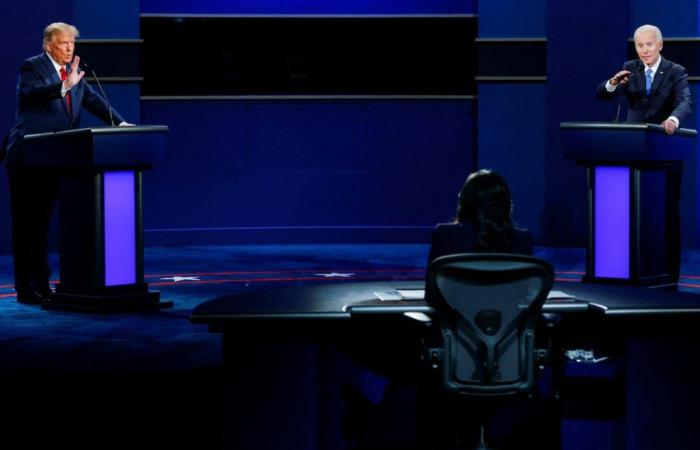
Unlike the debates that faced them in 2020, in which a sitting president of the United States (Donald Trump) faced off against an eternal candidate to be so (Joe Biden), this Thursday’s head-to-head in Atlanta begins now with a tie: that of two candidates who have already been presidents. The fact that they are both running for reelection also brings them closer: Historically, incumbent candidates have had difficulty in the first debate of their reelection campaign. The trend began with Ronald Reagan in 1984 and continued with Barack Obama in 2012 and Trump in 2020.
In 2020, the Democrat and the Republican also faced each other twice, of the three scheduled meetings: the second, in Miami, was canceled due to disagreements about the format and intervention times. A single debate was also held between the vice presidential candidates, Democrat Kamala Harris and Republican Mike Pence, on October 7. Trump and Biden’s first head-to-head match, which took place at nine p.m. on September 29, was a chaotic clash full of personal attacks. Moderator Chris Wallace of the conservative Fox News network had to reprimand them for their constant interruptions, most of them from Trump. At one point, Biden turned to his opponent and said, visibly upset: “Will you shut up, man?” The broadcast had an audience of 73.1 viewers, according to Nielsen measurement. It was the third most viewed in history in the United States.
In the second meeting, on October 22 at the same time — after one scheduled for October 15 was canceled — the discussion was more civilized thanks to a method that will be used this Thursday, the silencing of the microphones. This allowed the candidates to delve deeper into their proposals and at the same time into the ideological gap that separates them. Since then, the animosity between the two has only increased, first due to Trump’s unfounded claim of electoral fraud that year, then due to the assault on the Capitol and, finally, due to the Republican’s legal rosary, of which he accuses the Democrats. , and the guilty verdict for the Stormy Daniels case.
The first debate of 2020 proved unpopular with viewers, and also with Trump. According to polls, Biden was considered the winner of both meetings, which was a boost for his campaign. Now the roles are reversed: four years ago it was Trump who had to defend the achievements of his Administration and his poor performance in the polls. This time the examinee will be Biden, a political professional facing a rival who is told little or nothing about the rules of the game.
First debate: neither handshake nor masks
The first presidential debate of the last election was held at Case Western University in Cleveland (Ohio). It lasted 90 minutes, without commercial breaks. The place had to be improvised after the original location, the University of Notre Dame, alleged logistical problems due to the pandemic. The candidates did not shake hands or wear a mask (despite the fact that Biden did not take it off throughout the campaign and even after being elected). The questions were known only to the moderator, Chris Wallace, one of the most respected voices on Fox News for having been able to navigate the network’s sectarian drift and keep his personal reputation more or less intact.
Join EL PAÍS to follow all the news and read without limits.
Subscribe
Wallace arrived after having conducted ruthless and ruthless interviews with Donald Trump. The topics chosen by the journalist, in six 15-minute blocks, were the history of Trump and Biden; the Supreme Court—the Republican had just appointed the ultra-conservative Amy Coney Barrett as a judge, consecrating the court’s turn to the right; the covid-19 pandemic; the economy; racial tensions and violence in cities after the wave of street demonstrations over the death of African-American George Floyd, and the integrity of the electoral process.
Trump arrived at the debate as the president with the most media exposure—especially television—in history. Biden, as one of the best-known politicians in the country, with a half-century career, three times a candidate for president and, for eight years, vice president.
On October 9, two days after Harris and Pence met in Salt Lake City (Utah), the electoral commission canceled the scheduled second meeting, scheduled for October 15, due to disagreements between the electoral board and the teams. of the candidates about the format and speaking times.
The final debate: muted microphones
The second and final debate took place at Belmont University in Nashville, Tennessee, on October 22, with Kristen Welker of NBC News as moderator. The duration was the same, 90 minutes, also without commercial breaks. Like the first, it was divided into six 15-minute segments on the following topics, also selected by the journalist: fight against covid, families, race in the United States, climate change, national security and leadership.
To avoid the chaos that the first debate became, the electoral commission announced three days before that the microphones of each candidate would be silenced during the opponent’s two-minute opening speech in each of the six blocks. For the rest of the time, the microphones would be on to allow for open discussion. Both campaigns accepted the rules. The duration was divided between Trump, who spoke for 41.3 minutes, compared to Biden’s 37.9, according to CNN’s calculation. A minute similar to that of the first debate: 39.1 for the Republican, 37.9 for the Democrat. It was followed by 63 million viewers, ten million less than the first.
More or less in line with the thematic blocks, the candidates spoke about the pandemic, electoral interference, with the ghost of Russia planning over the elections; conflicts of interest abroad, with Trump’s accusing finger pointed at Hunter Biden’s dealings in Ukraine; China, North Korea, healthcare, economic stimulus to overcome the coronavirus crisis, immigration, race and climate change.
In his interventions, Biden denounced that Trump did not take responsibility for the 220,000 deaths caused by the coronavirus in the United States by then or have a plan to safely reopen the economy and schools. He proposed his health care program, Bidencare, an expansion of Obamacare with a public option. He also denounced Trump’s family separation policy at the border as violating the nation’s values. The Democrat called climate change an existential threat and said the country needed a transition from fossil fuels to renewable energy.
Trump, for his part, said there would be a coronavirus vaccine sooner than expected (something many of his supporters still reproach him for, even in the current election) and that schools and businesses needed to get back to normal as soon as possible. He accused Biden of failing to address immigration and criminal justice reform while he was Barack Obama’s vice president. He also accused his opponent, and his family, of receiving money from foreign countries. The Republican assured that his fiscal and regulatory policy would help rebuild the economy, and that success, the kind he boasted about during his career as a magnate and television star, would unify the country, when the truth is that his presidency polarized it to the point of almost tear it to shreds.
Follow all the information about the elections in the United States on our weekly newsletter.





